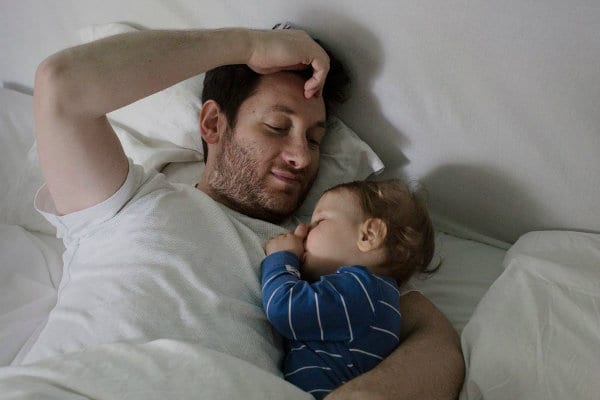Just let that sink in. More than a decade of efforts by many to prompt “culture change” and usher in a new era of domestic democracy for Australia’s mums and dads in heterosexual relationships — including that of successive governments of various political stripes, the self-proclaimed “Male Champions of Change”, and many more – have come up blank.
Nada. Nothing. “Almost no change”, pronounced AIFS yesterday.
The practical result is that mothers take up 95% of the primary carers leave in Australia and go on to return to work part-time in large numbers. Australia has some of the highest part-time work rates for women of any developed country in the world, according to the OECD.
This, the report found, “dramatically” affected mothers, entrenching the gender pay gap considerably. It takes most years to scale their work hours back up after going part-time to care for young children and many never recover their earning potential.
It is now a matter of indisputable fact that this “dramatic” affect means that the so-called “motherhood penalty” for Australian women is significant – and getting worse.
According to the Diversity Council, which regularly produces a report looking at the drivers of the gender pay gap, the influence of years not working, i.e. career interruptions, usually related to the birth of children, has more than doubled since the Diversity Council first researched the drivers of the gender pay gap ten years ago – the same ten years that have seen little change in men taking up flexible work. Coincidence? I think not.
Aside from the lack of flexible work take up, there’s no shortage of other statistics to illustrate the extent to which Australia is missing the mark in terms of promoting domestic equality.
According to the 2018 Household Income and Labour Dynamics in Australia survey, married women with children do more than 60 per cent of the housework and caring for dependants (on average an extra three hours a week).
Why should we care about that? Because it is often said that for there to be a revolution for women at work, there needs to be a revolution for men at home.
So here we are, and as tempting as it may be, I am not going to blame men for failing to do their fair share at home. If pressed, I’m sure I could find a number of examples of dinosaur fathers who like the current division of labour just fine, or so-called “woke” dads who talk the talk, but fail to walk the walk at home.
Instead, I’m going to lay the majority of the blame firmly at the feet of the Government and employers for failing to adopt policies that create an environment where men (and their partners) can make different “choices” about how they divide work and care.
Yes, I’m calling it. Whatever policy makers and employers think they have been doing for the last ten years, it’s not working. It’s time to do something different.
And if I may be so bold as to offer some unsolicited advice, what better time than at the dawn of a new Government, with a newly appointed Minister for Women in Senator Marise Payne, to learn the lessons of last ten years of abject failure and start down a different path.
Because here’s the thing: men and their partner’s “choices” about how to divide work and care do not play out in a vacuum, much like the supposed “choices” women make that are said to contribute to the gender pay gap – the “choice” to enter a certain profession, the “choice” to work part time or take time out of the workforce — are heavily influenced by the policy and cultural context in which they are made.
Here’s what we know about the context in which men are considering whether or not to take up flexible work options or a greater percentage of the caring.
Australia does not have legislated shared parental leave, unlike many OECD countries, which is something that has been found to be an effective leaver to expedite culture change, particularly use it or lose it provision for fathers.
Australian fathers experience some of the most unequal parental leave policies in the world, according to the 2015 Save the Children Report The State of Australian Fathers, which is a major obstacle in early bonding for fathers and their children.
Australian fathers also have good reason to fear a “fatherhood penalty” akin to that already experienced by women if they make use of the limited leave arrangements currently available to them. A 2016 study into flexibility at work by the business consulting firm Bain and Co and Chief Executive Women found that 60 percent of men wanted more flexible working hours but there was a lack of senior support. A 2014 Australian Human Rights Commission report found that men were twice as likely as women to have their requests for flexible work denied.
A sober appraisal of this context alongside clear evidence that the current approach is not yielding dividends should prompt a radical rethink by Government policy makers and their like-minded partners amongst Australia’s employers.
I note that Minister Payne’s predecessor in the role of Minister for Women, Kelly O’Dwyer, recently oversaw the government’s first economic security statement for women entitled, “Greater Choice for Australian Women”. Perhaps it’s time for a companion piece, “Greater Choice for Australian Fathers”.
Kristine Ziwica tweets @KZiwica


